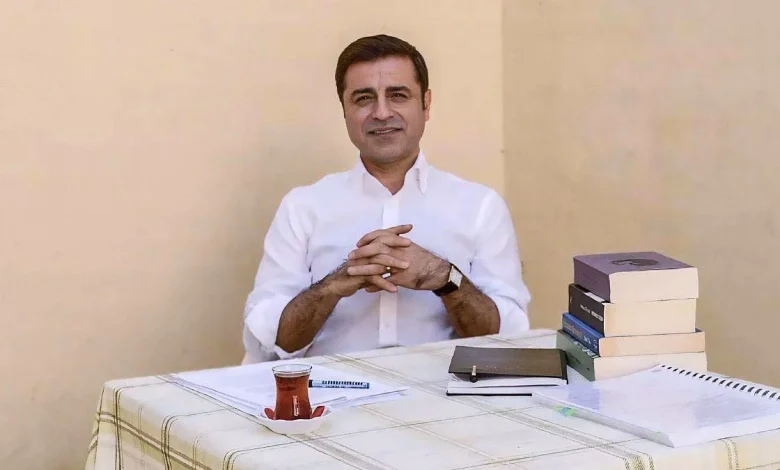Talk About Democracy and Europe? Then Free Selahattin Demirtaş

The European Court of Human Rights (ECHR) rejected the Ministry of Justice’s objection, making the ruling of rights violation final. Releasing Selahattin Demirtaş is legally binding — and politically, an opportunity. The photo shows Demirtaş working on his writings in Edirne Prison, where he has completed nine years.
Former Democratic People’s Party (HDP) co-leader Demirtaş was detained and arrested on November 4, 2016. November 3, marked nine years since his imprisonment began. On the same day, the European Court of Human Rights (ECHR) rejected Turkey’s appeal—lodged on October 8—to have his case reviewed by the Grand Chamber. That decision makes the Court’s earlier finding, that Demirtaş’s conviction constituted a violation of rights, final and binding.
I won’t revisit the details of the Demirtaş case or the injustices surrounding it—T24’s Gökçer Tahincioğlu has already provided an excellent summary for those who wish to refresh their memory What matters here is that both Turkey’s Constitutional Court (AYM) and the ECHR have previously ruled in Demirtaş’s favor—yet those judgments remain unimplemented.
When the Justice Ministry appealed the ECHR’s October 8 ruling, both the DEM Party and the CHP criticized the move, calling it inconsistent with the government’s ongoing “Terror-Free Turkey” initiative.
Demirtaş, in a written statement from Edirne Prison, also made reference to that process:
“The ECHR ruling is, of course, important and legally binding. But beyond our case, what truly matters for all 86 million citizens is the ‘law of brotherhood’ that binds us together.”
A Terror-Free Turkey—and the Hope for Democracy
Now that even MHP leader and President Erdoğan’s ally Devlet Bahçeli has said “His release would be auspicious,” there is reason for cautious optimism. Still, it’s worth examining the issue through the lens of democracy and rights.
On November 2, President Erdoğan’s Chief Legal Advisor Mehmet Uçum wrote that new steps would soon be taken under the “Terror-Free Turkey” framework—and, for the first time, he referred to the “expectations for the development and strengthening of democracy.”
But it’s hard to talk about strengthening democracy while opposition politicians remain behind bars. And this is not only about Demirtaş and other HDP/DEM figures, nor just about Ekrem İmamoğlu and CHP members, or Osman Kavala and the Gezi defendants.
Trying to build closer ties with Europe—while managing a delicate balance between the Russia-Ukraine war and the Israel-Iran tensions through a triangle of the military, intelligence, and foreign affairs apparatus—can only go so far.
At a joint press conference in Ankara on October 30 with German Chancellor Friedrich Merz, President Erdoğan once again voiced his government’s desire to revive EU membership talks. Merz, however, pointedly referred to the Copenhagen political criteria. Setting aside full membership, Turkey’s government has yet to fulfill six of the commitments it made in 2016 to secure visa liberalization for Turkish citizens.
Release Demirtaş—and the Others Too
Article 90 of Turkey’s Constitution—adopted under the AK Party with CHP support—already provides a clear legal basis for implementing ECHR rulings. Simply upholding this provision would create the space needed to ease tensions and rebuild trust.
The Demirtaş ruling is an opportunity. It should be seized immediately. Demirtaş should be released, setting a precedent for other cases.
The Constitutional Court’s October 17 decision in Tayfun Kahraman’s case is another such opportunity—he should be released and retried.
As newly appointed Court of Cassation President Ömer Kerkez emphasized in his October 20 speech, rulings by the Constitutional Court must be respected. For instance, TİP MP Can Atalay, still imprisoned despite a Constitutional Court ruling in his favor, should be freed and allowed to resume his parliamentary duties.
ECHR rulings in the cases of Osman Kavala and Figen Yüksekdağ must also be enforced. Likewise, Çiğdem Mater Utku and Mine Özerden, who were convicted in the Gezi trial alongside Kavala, should be released and retried.
None of this requires a new “transitional law” or any additional legislation. Implementing the current Constitution and existing laws is more than enough.
If the government truly means it when it speaks of democracy and European integration, here lies the chance to prove it:
Release Demirtaş—and the others too.





